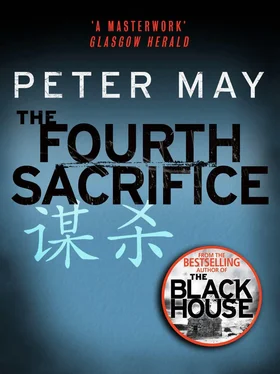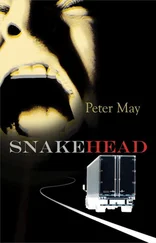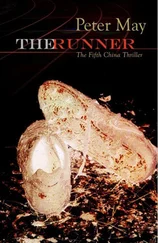Peter May - The Fourth Sacrifice
Здесь есть возможность читать онлайн «Peter May - The Fourth Sacrifice» весь текст электронной книги совершенно бесплатно (целиком полную версию без сокращений). В некоторых случаях можно слушать аудио, скачать через торрент в формате fb2 и присутствует краткое содержание. Год выпуска: 2012, Издательство: Quercus, Жанр: Триллер, на английском языке. Описание произведения, (предисловие) а так же отзывы посетителей доступны на портале библиотеки ЛибКат.
- Название:The Fourth Sacrifice
- Автор:
- Издательство:Quercus
- Жанр:
- Год:2012
- ISBN:нет данных
- Рейтинг книги:4 / 5. Голосов: 1
-
Избранное:Добавить в избранное
- Отзывы:
-
Ваша оценка:
- 80
- 1
- 2
- 3
- 4
- 5
The Fourth Sacrifice: краткое содержание, описание и аннотация
Предлагаем к чтению аннотацию, описание, краткое содержание или предисловие (зависит от того, что написал сам автор книги «The Fourth Sacrifice»). Если вы не нашли необходимую информацию о книге — напишите в комментариях, мы постараемся отыскать её.
The Fourth Sacrifice — читать онлайн бесплатно полную книгу (весь текст) целиком
Ниже представлен текст книги, разбитый по страницам. Система сохранения места последней прочитанной страницы, позволяет с удобством читать онлайн бесплатно книгу «The Fourth Sacrifice», без необходимости каждый раз заново искать на чём Вы остановились. Поставьте закладку, и сможете в любой момент перейти на страницу, на которой закончили чтение.
Интервал:
Закладка:
Mr Lao led Margaret into the main hall. ‘I didn’t realise excavations were still going on,’ she said. ‘I thought it was all finished.’
Mr Lao laughed. ‘It ma-any years before we finish, Miss Margaret. There are maybe six thousand warrior and horse in here. We uncover, maybe, one third.’ And they stepped out on to a gantry that ran all the way around the pit.
Margaret was not certain what she had been expecting, but it had been nothing on this scale. An intricate network of scaffolding supported a roof that arched over an excavation site that shimmered off into a hazy blue distance. Immediately below them, between high walls of rammed earth that stretched away both left and right, stood the warriors. Some two thousand of them, in battle formation. In gaps between the ranks, horses stood patiently, harnessed to wooden chariots that had long since decayed and disappeared. Sunlight fell in angled slabs through occasional windows in the roof, and lay across the silent soldiers, casting shadows across ancient faces.
The hair rose up on Margaret’s neck and arms, and she felt tears prick her eyes. She blinked, surprised at her reaction. She had not anticipated anything like this. But there was something startling in the sight of these life-sized figures, something extraordinary in their silent dignity, in their patient vigil. They stood, still guarding their emperor’s tomb, with a mute determination. All around, the voices of chattering tourists filled the hall, and Margaret was consumed by an almost irresistible desire to shout at them. To tell them to shut up. There was something here that deserved the dignity of silence, the awe and respect of all who cast eyes on it. This was a privilege, a rare glimpse of a priceless heritage, an insight into the minds of men, their fears and beliefs, their endless futile attempts to transcend death. And in a way, the men who had created these figures had achieved a kind of immortality. For here their warriors still stood, a testament to their makers’ existence, silent witnesses to a dawn that predated Christ.
She turned to find Mr Lao smiling at her. ‘You are impressed,’ he said.
‘I don’t know what I am,’ Margaret said. ‘Speechless, really. They are …’ she searched for the right word, ‘… fabulous,’ she finished lamely, unable to find an adjective that could adequately describe her feelings.
‘You come,’ he said. ‘I show you more than tourist see.’ And she followed him around the gantry, gazing down on the figures below as they went.
There was a sudden clamour of raised voices, and she turned to see a green-uniformed police officer snatching a camera from a struggling Chinese tourist. The man and his wife screamed at the officer, waving their arms belligerently, as he opened up their camera and ripped out the film, exposing its entire length to the light.
‘It forbidden to take photograph here,’ Mr Lao said. He shrugged philosophically. ‘It happen all the time.’
At the far end of the site, raised on an area that had not yet been excavated, Margaret could see now that there were hundreds of pottery figures crowding together, archaeologists moving amongst them, piecing together the broken bits and pieces that would make them whole again. A large motorised conveyer belt was removing great piles of excavated earth out through a large rear hatch. But this was an area not open to the public. And below them now, crouched in the dust, white-shirted archaeologists of all ages worked among dozens more figures, still immersed in earth, and emerging centimetre by centimetre from their ancient graves as brushes and knives scooped and swept away the layers of time that had buried them.
Mr Lao opened a gate and Margaret followed him into an area off limits to tourists, down stippled metal steps to where a small group of archaeologists was at work: two men, and a young woman perhaps a little younger than Margaret. Mr Lao made introductions in Chinese, and they all shook her hand and bowed their heads and smiled. Mr Lao handed her a short, round-bladed knife with a curved handle that fitted the back of the hand behind the thumb and forefinger. ‘Now you be archaeologist, too,’ he smiled. ‘Miss Zhang show you how.’
Miss Zhang smiled and handed her a black-bristled brush and led her among a cluster of pottery bodies emerging at strange angles from the soil. Some of them were cracked and broken at the shoulder. Others had heads lying crookedly to one side or another. Some had no heads at all — a strangely evocative image, bringing back to Margaret a sudden recollection of why she was still here in China.
These were armoured warriors, elaborately carved squares of studded armour draped across their chests, hair piled high in knots on their heads, silk scarves around their necks. Miss Zhang squatted down beside two figures still waist-deep in the earth. One lay at a crazy angle, his head resting on the shoulder of his companion, as if he had wearied of his two-thousand-year existence. Their features were still partially obscured by caked mud.
Miss Zhang worked carefully with her knife to scrape the earth away to reveal the clean line of the jaw, then brushed away the dust with her brush. She indicated, with a smile and a nod, that Margaret should do the same. Margaret crouched beside her and nervously, very tentatively, scraped away the earth gradually to reveal the good strong features of the warrior: fine, full lips, a moustache that curved up to his cheekbones, almond eyes beneath strong brows. She brushed away the debris and looked at him. He was beautiful. She touched his cool, smooth pottery features and felt a sensation like electricity run through her fingertips. She was touching more than two thousand years of history. A man had carved these features at a time when the Romans had ruled Europe, nearly seventeen centuries before her own country had even been discovered. And for the first time she really understood Michael’s passion. There was more life in this pottery creation of fired clay than in any of the bodies that had passed through her autopsy room; cold, dead, decaying flesh that would simply have vaporised in the kind of temperatures that had brought these ancient warriors to life and preserved them across the millennia.
There were still occasional traces of the original paintwork, and Margaret saw now that beneath the orange-coloured earth, the figures were a deep blue-black, the dark blue dust shed by their broken bodies gathered around them like the dust of time.
IV
Chang Yichun might have been a child of the Communist Liberation, but he was a highly successful capitalist of the post-Mao era, as he took great delight in telling Li and Zhao. The bell had rung some time ago, and through the open windows came the sounds of children playing out in the quadrangle.
Chang was a short man, but powerfully built, with close-cropped hair and big, callused hands. He considered himself better than all his more academically minded classmates of the sixties. He had done all right here at the No. 29 Middle School, he admitted grudgingly, but what good were qualifications when you just got sent to labour in the countryside? Such had been his fate in the Cultural Revolution.
He drew on an expensive Western cigarette. ‘Irony was, it turned out to be the making of me,’ he said. ‘Learned my trade as a carpenter, and when I came back to the city in ’72 I got a job on the maintenance and building team of the Xichang Street Committee.’ He scratched his head and then brushed the dandruff off the lapel of his designer suit. ‘There were twenty others, unemployed like me, and six women. We mended central heating systems, built chimneys, did odd jobs around all the houses. It was a farce. Totally unprofessional. It was the social monkeys — you know, the ones who hung around the streets all day — that got us the jobs. They fixed the worksheets, took extra wages, and then kept everything that was left after paying the wages. In seven years we ran up debts of nearly ninety thousand yuan.’
Читать дальшеИнтервал:
Закладка:
Похожие книги на «The Fourth Sacrifice»
Представляем Вашему вниманию похожие книги на «The Fourth Sacrifice» списком для выбора. Мы отобрали схожую по названию и смыслу литературу в надежде предоставить читателям больше вариантов отыскать новые, интересные, ещё непрочитанные произведения.
Обсуждение, отзывы о книге «The Fourth Sacrifice» и просто собственные мнения читателей. Оставьте ваши комментарии, напишите, что Вы думаете о произведении, его смысле или главных героях. Укажите что конкретно понравилось, а что нет, и почему Вы так считаете.












